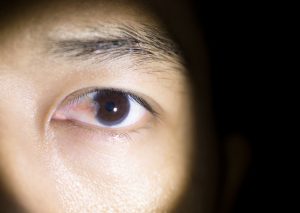

Pterygium which is also known as surfer’s eye is a growth of vascular tissue and conjunctiva ( the outer surface of the white of the eye onto the cornea. Pterygia are more common the closer one lives to the equator. They are very common in those that work out-of-doors in dry dusty environments. This would include farmers and agriculture workers. When ptergyias grow to far on the cornea toward the pupil center they can cause an irregular surface ( irregular astigmatism ) which can distort one’s vision.
A pterygium is an abnormal growth of the conjunctiva (the tissue on the surface of the eye). Also referred to as surfer’s eye disease, these growths typically result from excessive sun exposure and are more common in people who live in warmer environments. Similar to sun damage on the skin, pterygium typically develop over several years. While pterygia are benign and generally painless, they can affect your quality of vision when they change the surface of your cornea, causing a condition called irregular astigmatism. Irregular astigmatism can not be corrected with glasses or soft contact lenses.

A pinguecula is a slightly raised lesion located on the white part of the eye, near the cornea, and is typically yellowish or very light brown in color. Pingueculae form in response to cumulative sun exposure, making them more likely to develop in middle-aged or older people who have had extensive sun exposure without wearing sunglasses or hats. That being said, pingueculae can also occur in younger people, provided that they’ve spent a significant amount of unprotected time in the sun. Some pingueculae will convert or progress to a pterygia.

Pterygia and pingueculae typically do not have symptoms, meaning they may not need immediate treatment from an eye doctor. However, large pterygia and pingueculae may be uncomfortable for some patients and feel like a persistent foreign body sensation in the eye. Pterygia and pingueculae can also become inflamed and red. As a pterygium progresses, it can distort the curvature of your cornea and cause blurry vision. These are all instances where you may choose to seek treatment from an eye doctor.
The precise cause of pterygium and pinguecula is not known, but a widely accepted pterygium risk factor is excessive exposure to UV light without wearing sunglasses or hats. People living in tropical or southern locations, or who otherwise spend a significant amount of time in sunny or windy climates, are at a greater risk for developing pterygium and pinguecula. Pterygium and pinguecula may also be hereditary conditions.
It is important to have your eyes checked by an eye doctor as soon as possible if you think you may have pterygium/pinguecula/surfer’s eye. The eye care experts at Discover Vision Centers can recommend the best treatment option for your unique circumstances. Book your consultation with an eye surgeon at Discover Vision Centers today!
Your eye doctor will use a special microscope called a slit lamp to determine whether or not you have surfer’s eye, pterygium or pinguecula. A slit lamp exam is a regular part of a comprehensive eye exam, and this procedure enables your eye care provider to see the front and inside of your eye.
Your eye doctor may also provide the following tests to assess your condition:
If pinguecula and pterygium are in their early stages and cause mild irritation, they can be treated without surgery using eye drops or artificial tears.
In other cases, your doctor may recommend removal of pinguecula or pterygium if the growth:
Your eye doctor might recommend you to use medicated eye drops. In more serious cases, your doctor may suggest that the growth be surgically removed.
Surfer’s eye surgery (or pterygium surgery) involves the removal of the growth from the eye in an operating room. Your surgeon may replace the affected tissue with conjunctiva (eye tissue) from unaffected parts of your eye, depending on the extent of your condition. If the pterigyia or pinguecula is large, your doctor may apply an amniotic membrane (a supportive tissue) to support your eye’s healing process. In total, pterygium surgery takes between 30 minutes and an hour. If your doctor recommends surgery for both eyes, the procedures will likely occur on separate days. This will enable you to see out of one eye as the other eye is recovering.
Pterygium surgery recovery time typically takes at least a month, in which time you will typically take an antibiotic and steroid drops to minimize the chances of infection and mitigate inflammation and eye dryness. Your surgeon will usually place a temporary bandage contact lens for comfort as the surface tissues heal.
Pterygium can come back months or years later, although this is unlikely. In the case of recurrent pterygium, your eye care provider may allow you to repeat the surgery using additional approaches to help prevent it from coming back again.
If you are curious whether pterygium surgery will be covered by insurance, the answer is yes. Because pterygia and pinguecula are considered medical diagnoses, their treatment and removal should be covered by your insurance. However, you should verify your coverage with your specific plan to learn whether there is an out of pocket expense or pterygium removal cost beyond your benefits. Our team will also verify your insurance coverage if your doctor determines that surgery is the best path forward.
Discover Vision Centers doctors and surgeons are well-versed in the diagnosis and management of pterygia and pinguecula. Our surgery centers are fully equipped to treat all levels of these conditions. Once treated our doctors will provide the best solutions for vision correction.
The professional eye surgeons at Discover Vision Centers are well versed in pterygium, pinguecula, and all other eye conditions. In a comprehensive eye exam at Discover Vision Centers, an expert will thoroughly assess your eyes and determine the best treatment plan for you.
It is important to have your eyes checked by an eye doctor as soon as possible if you think you may have pterygium/pinguecula/surfer’s eye. The eye cMare experts at Discover Vision Centers can recommend the best treatment option for your unique circumstances. Book your consultation with an eye surgeon at Discover Vision Centers today!
If one works or plays out-of-doors sunglasses and hats can minimize the light exposure, wind and dust that induces pterygia and pinguecula development.
Complications are rare with pterygia. You will be placed on topical antibiotics to prevent infection and also will be instructed to use topical corticosteroids to control the healing process. You likely will be on topical steroid drops for several months in decreasing frequency.
Most patient will feel comfortable to drive the day after their surgery.
Pterygia surgery itself is not painful. The first 1-4 days after pterygia surgery the patient can experience foreign body sensation, light sensitivity, and tearing. You will be prescribed topical and oral pain pills if needed.